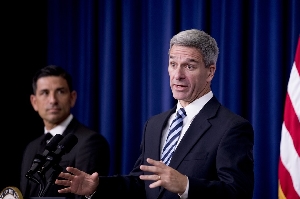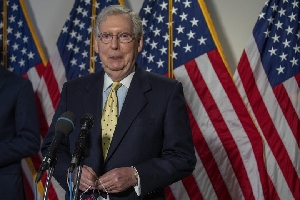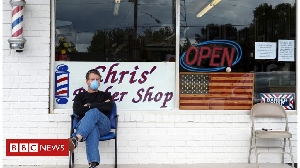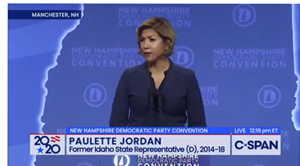UserWiki:Kirk Sandbox: Difference between revisions
No edit summary |
No edit summary |
||
| Line 47: | Line 47: | ||
|- | |||
|[[File:4032.jpg|left|thumb|[https://www.theguardian.com/commentisfree/2020/aug/26/us-farming-agriculture-food-supply-danger Unless we change course, the US agricultural system could collapse | Tom Philpott]]]||[[File:AP 20184644447741.jpg|left|thumb|[https://www.dailykos.com/stories/2020/8/14/1969214/-Legislators-demand-resignations-after-GAO-finds-DHS-leaders-were-unlawfully-appointed-to-positions Legislators demand resignations after GAO finds DHS leaders were unlawfully appointed to positions]]] | |||
|[[File:Medium Cows.png|left|thumb|[https://medium.com/@phuonghatrannguyen00/the-most-awesome-climate-solutions-that-no-one-is-talking-about-743bb22aa232 The Most Awesome Climate Solutions that No One is Talking About.]]] | |||
|- | |||
|[[File:Police Unions.jpg|left|thumb|[https://www.newyorker.com/magazine/2020/08/03/how-police-unions-fight-reform How Police Unions fight Reforms- The New Yorker]]]|| [[File:Ccbb6c12-8a6b-4aa6-a534-4688a77ecc01.jpg|left|thumb|[https://slate.com/news-and-politics/2020/07/coronavirus-relief-bill-negotiations-mitch-mcconnell.html Why Is It Taking So Long to Get Another Coronavirus Relief Package?]]] ||[[File:113639944 gettyimages-1210880576.jpg|left|thumb|[https://www.bbc.com/news/business-53534435 The millions of Americans 'hanging by a thread']]] | |||
{| | {| | ||
Revision as of 09:08, 29 December 2020
I like to use my "UserWiki" as a "Sandbox", meaning I try things out here before posting them elsewhere. It is a good way to learn without messing up other pages. It is also useful for writing drafts including wiki format which can then be copied and posted when finalized.
Dependent on a minority of the population to hold national power, Republicans such as Senator Mike Lee of Utah have taken to reminding the public that “we’re not a democracy.” It is quaint that so many Republicans, embracing a president who routinely tramples constitutional norms, have suddenly found their voice in pointing out that, formally, the country is a republic. There is some truth to this insistence. But it is mostly disingenuous. The Constitution was meant to foster a complex form of majority rule, not enable minority rule.
The founding generation was deeply skeptical of what it called “pure” democracy and defended the American experiment as “wholly republican.” To take this as a rejection of democracy misses how the idea of government by the people, including both a democracy and a republic, was understood when the Constitution was drafted and ratified. It misses, too, how we understand the idea of democracy today.
George Packer: Republicans are suddenly afraid of democracy
When founding thinkers such as James Madison spoke of democracy, they were usually referring to direct democracy, what Madison frequently labeled “pure” democracy. Madison made the distinction between a republic and a direct democracy exquisitely clear in “Federalist No. 14”: “In a democracy, the people meet and exercise the government in person; in a republic, they assemble and administer it by their representatives and agents. A democracy, consequently, will be confined to a small spot. A republic may be extended over a large region.” Both a democracy and a republic were popular forms of government: Each drew its legitimacy from the people and depended on rule by the people. The crucial difference was that a republic relied on representation, while in a “pure” democracy, the people represented themselves.
At the time of the founding, a narrow vision of the people prevailed. Black people were largely excluded from the terms of citizenship, and slavery was a reality, even when frowned upon, that existed alongside an insistence on self-government. What this generation considered either a democracy or a republic is troublesome to us insofar as it largely granted only white men the full rights of citizens, albeit with some exceptions. America could not be considered a truly popular government until the passage of the Civil Rights Act of 1964 and the Voting Rights Act of 1965, which commanded equal citizenship for Black Americans. Yet this triumph was rooted in the founding generation’s insistence on what we would come to call democracy.
The history of democracy as grasped by the Founders, drawn largely from the ancient world, revealed that overbearing majorities could all too easily lend themselves to mob rule, dominating minorities and trampling individual rights. Democracy was also susceptible to demagogues—men of “factious tempers” and “sinister designs,” as Madison put it in “Federalist No. 10”—who relied on “vicious arts” to betray the interests of the people. Madison nevertheless sought to defend popular government—the rule of the many—rather than retreat to the rule of the few.
American constitutional design can best be understood as an effort to establish a sober form of democracy. It did so by embracing representation, the separation of powers, checks and balances, and the protection of individual rights—all concepts that were unknown in the ancient world where democracy had earned its poor reputation.
In “Federalist No. 10” and “Federalist No. 51,” the seminal papers, Madison argued that a large republic with a diversity of interests capped by the separation of powers and checks and balances would help provide the solution to the ills of popular government. In a large and diverse society, populist passions are likely to dissipate, as no single group can easily dominate. If such intemperate passions come from a minority of the population, the “republican principle,” by which Madison meant majority rule, will allow the defeat of “sinister views by regular vote.” More problematic are passionate groups that come together as a majority. The large republic with a diversity of interests makes this unlikely, particularly when its separation of powers works to filter and tame such passions by incentivizing the development of complex democratic majorities: “In the extended republic of the United States, and among the great variety of interests, parties, and sects which it embraces, a coalition of a majority of the whole society could seldom take place on any other principles than those of justice and the general good.” Madison had previewed this argument at the Constitutional Convention in 1787 using the term democracy, arguing that a diversity of interests was “the only defense against the inconveniences of democracy consistent with the democratic form of government.”
Jeffrey Rosen: America is living James Madison’s nightmare
Yet while dependent on the people, the Constitution did not embrace simple majoritarian democracy. The states, with unequal populations, got equal representation in the Senate. The Electoral College also gave the states weight as states in selecting the president. But the centrality of states, a concession to political reality, was balanced by the House of Representatives, where the principle of representation by population prevailed, and which would make up the overwhelming number of electoral votes when selecting a president.
But none of this justified minority rule, which was at odds with the “republican principle.” Madison’s design remained one of popular government precisely because it would require the building of political majorities over time. As Madison argued in “Federalist No. 63,” “The cool and deliberate sense of the community ought, in all governments, and actually will, in all free governments, ultimately prevail over the views of its rulers.”
Alexander Hamilton, one of Madison’s co-authors of The Federalist Papers, echoed this argument. Hamilton made the case for popular government and even called it democracy: “A representative democracy, where the right of election is well secured and regulated & the exercise of the legislative, executive and judiciary authorities, is vested in select persons, chosen really and not nominally by the people, will in my opinion be most likely to be happy, regular and durable.”
The American experiment, as advanced by Hamilton and Madison, sought to redeem the cause of popular government against its checkered history. Given the success of the experiment by the standards of the late 18th and early 19th centuries, we would come to use the term democracy as a stand-in for representative democracy, as distinct from direct democracy.
Consider that President Abraham Lincoln, facing a civil war, which he termed the great test of popular government, used constitutional republic and democracy synonymously, eloquently casting the American experiment as government of the people, by the people, and for the people. And whatever the complexities of American constitutional design, Lincoln insisted, “the rule of a minority, as a permanent arrangement, is wholly inadmissible.” Indeed, Lincoln offered a definition of popular government that can guide our understanding of a democracy—or a republic—today: “A majority, held in restraint by constitutional checks, and limitations, and always changing easily, with deliberate changes of popular opinions and sentiments, is the only true sovereign of a free people.”
The greatest shortcoming of the American experiment was its limited vision of the people, which excluded Black people, women, and others from meaningful citizenship, diminishing popular government’s cause. According to Lincoln, extending meaningful citizenship so that “all should have an equal chance” was the basis on which the country could be “saved.” The expansion of we the people was behind the Fourteenth and Fifteenth Amendments ratified in the wake of the Civil War. The Fourteenth recognized that all persons born in the U.S. were citizens of the country and entitled to the privileges and immunities of citizenship. The Fifteenth secured the vote for Black men. Subsequent amendments, the Nineteenth, Twenty-Fourth, and Twenty-Sixth, granted women the right to vote, prohibited poll taxes in national elections, and lowered the voting age to 18. Progress has been slow—and sometimes halted, as is evident from current efforts to limit voting rights—and the country has struggled to become the democratic republic first set in motion two centuries ago. At the same time, it has also sought to find the right republican constraints on the evolving body of citizens, so that majority rule—but not factious tempers—can prevail.
Adam Serwer: The Supreme Court is helping Republicans rig elections
Perhaps the most significant stumbling block has been the states themselves. In the 1790 census, taken shortly after the Constitution was ratified, America’s largest state, Virginia, was roughly 13 times larger than its smallest state, Delaware. Today, California is roughly 78 times larger than Wyoming. This sort of disparity has deeply shaped the Senate, which gives a minority of the population a disproportionate influence on national policy choices. Similarly, in the Electoral College, small states get a disproportionate say on who becomes president. Each of California’s electoral votes is estimated to represent 700,000-plus people, while one of Wyoming’s speaks for just under 200,000 people.
Subsequent to 1988, the Republican presidential candidate has prevailed in the Electoral College in three out of seven elections, but won the popular vote only once (2004). If President Trump is reelected, it will almost certainly be because he once again prevailed in the Electoral College while losing the popular vote. If this were to occur, he would be the only two-term president to never win a plurality of the popular vote. In 2020, Trump is the first candidate in American history to campaign for the presidency without making any effort to win the popular vote, appealing only to the people who will deliver him an Electoral College win. If the polls are any indication, more Americans may vote for Vice President Biden than have ever voted for a presidential candidate, and he could still lose the presidency. In the past, losing the popular vote while winning the Electoral College was rare. Given current trends, minority rule could become routine. Many Republicans are actively embracing this position with the insistence that we are, after all, a republic, not a democracy.
They have also dispensed with the notion of building democratic majorities to govern, making no effort on health care, immigration, or a crucial second round of economic relief in the face of COVID-19. Instead, revealing contempt for the democratic norms they insisted on when President Barack Obama sought to fill a vacant Supreme Court seat, Republicans in the Senate have brazenly wielded their power to entrench a Republican majority on the Supreme Court by rushing to confirm Justice Amy Coney Barrett. The Senate Judiciary Committee vote to approve Barrett also illuminates the disparity in popular representation: The 12 Republican senators who voted to approve of Barrett’s nomination represented 9 million fewer people than the 10 Democratic senators who chose not to vote. Similarly, the 52 Republican senators who voted to confirm Barrett represented 17 million fewer people than the 48 senators who voted against her. And the Court Barrett is joining, made up of six Republican appointees (half of whom were appointed by a president who lost the popular vote) to three Democratic appointees, has been quite skeptical of voting rights—a severe blow to the “democracy” part of a democratic republic. In 2013’s Shelby County v. Holder, the Court struck down a section of the Voting Rights Act of 1965 that allowed the federal government to preempt changes in voting regulations from states with a history of racial discrimination.
As Adam Serwer recently wrote in these pages, “Shelby County ushered in a new era of experimentation among Republican politicians in restricting the electorate, often along racial lines.” Republicans are eager to shrink the electorate. Ostensibly seeking to prevent voting fraud, which studies have continually shown is a nonexistent problem, Republicans support efforts to make voting more difficult—especially for minorities, who do not tend to vote Republican. The Republican governor of Texas, in the midst of a pandemic when more people are voting by mail, limited the number of drop-off locations for absentee ballots to one per county. Loving, with a population of 169, has one drop-off location; Harris, with a population of 4.7 million (majority nonwhite), also has one drop-off location. States controlled by Republicans, such as Georgia, Louisiana, and Texas, have also closed polling places, making voters in predominantly minority communities stand in line for hours to cast their ballot.
Who counts as a full and equal citizen—as part of we the people—has shrunk in the Republican vision. Arguing against statehood for the District of Columbia, which has 200,000 more people than the state of Wyoming, Senator Tom Cotton from Arkansas said Wyoming is entitled to representation because it is “a well-rounded working-class state.” It is also overwhelmingly white. In contrast, D.C. is 50 percent nonwhite.
High-minded claims that we are not a democracy surreptitiously fuse republic with minority rule rather than popular government. Enabling sustained minority rule at the national level is not a feature of our constitutional design, but a perversion of it. Routine minority rule is neither desirable nor sustainable, and makes it difficult to characterize the country as either a democracy or a republic. We should see this as a constitutional failure demanding constitutional reform.
|-
|

||

|

|-
|

||

||

<embed> https://www.theguardian.com/us-news/commentisfree/2020/jun/02/in-1919-the-state-failed-to-protect-black-americans-a-century-later-its-still-failing </embed> <embed> https://www.nature.com/articles/d41586-020-01455-w?utm_source=Nature+Briefing&utm_campaign=4b56fd8c7f-briefing-dy-20200528&utm_medium=email&utm_term=0_c9dfd39373-4b56fd8c7f-42787455&fbclid=IwAR25p9YRizBEko4rcFgl8vqiOJUeQHpbjycGmGuSOOQEuMnClGlwFhHMAC4 </embed> <embed> https://www.dailykos.com/stories/2020/5/31/1949049/--We-learned-violence-from-you-Activist-Tamika-Mallory-captures-heart-of-protests-with-vital-speech </embed> <embed> https://www.pnas.org/content/117/21/11350?fbclid=IwAR0wabet8x0IZgYeq9mT358nFr1iSOK_nHvO_NY1mHiuKx3r51kV_CzOgec </embed >Our results reveal that today, humans, as well as the production of crops and livestock (Fig. 1 A, D, and E), are concentrated in a strikingly narrow part of the total available climate space (Fig. 1G). This is especially true with respect to the mean annual temperature (MAT), where the main mode occurs around ∼11 °C to 15 °C (SI Appendix, Fig. S1). By contrast, much of range of precipitation available around that temperature (Fig. 1G and SI Appendix, Fig. S1) is used, except for the driest end. Soil fertility does not seem to be a major driver of human distribution (Fig. 1H), nor can potential productivity be a dominant factor, as net primary productivity shows a quite different geographical distribution (Fig. 1I), peaking in tropical rainforests, which have not been the main foci of human settlement.


<embed> https://www.youtube.com/watch?v=hxvtO57_tPE </embed> <embed> https://www.dailykos.com/stories/2020/5/28/1948297/-Nancy-Pelosi-stopped-Andrea-Mitchell-cold-directing-her-messaging-Not-Trump-s-but-one-for-Americans?utm_campaign=trending </embed>
<embed> https://insideclimatenews.org/news/26052020/trillion-trees-climate-change?fbclid=IwAR1IbwdoPcd6kSeUZNrH-oljLFrD_wn2WrKM2QcX1pa_viOpHr7hjJmlFnM </embed>
<embed> https://www.theguardian.com/us-news/2020/may/27/honest-elections-project-conservative-voting-restrictions </embed>
<embed> https://www.nature.com/articles/d41586-020-01403-8?fbclid=IwAR2MlB0wwzdHs_A3WVhh5UFr2FPF5lMd0hrC2NPytgxnlBaWtLtrfKEQ3l4 </embed>
Biden [is] officially the nominee of the Democratic Party. And when you look at what politicians can offer a country you look more at the types of administrative appointments and their general overall policies and those of the party they belong to, rather than what they are as a person. Judging their policy initiatives by their personality or even what they say during their election campaign can be deceptive.
You seem interested in my hypothesis regarding the current presidential election, usually I don’t talk about it with people because I find people’s decisions are generally emotional driven and they are not interested in a more rational indepth discussion.
So let’s look at 6 priorities that I considered to be very important in terms of political policies: Judicial Appointments, Environmental Policy, Climate Change amelioration and adaptation, Income Inequality/Racism, Democracy and Health Care.
Look at Trump's appointments to the judicary- they are straight from the Federalist's Society training camp where they learn "Judicial Originalism" . And they now control the SCOTUS and several lower courts. Biden's judges would most likely be along the lines of Obama's - pretty moderate but certainly not wild-eyed originalists that want to recreate the social contract of 1776 including its rather heavy handed religious fundamentalism. Would Biden pick better judges than Trump? Clearly, yes! Would he be perfect? No.
Next look at Trump's executive actions regarding environmental policies. Trump has rolled back more environmental protections than any other president in history, he has pretty much granted all the wishes of the fossil fuel/resource extraction industry. In states that are also controlled by the fossil fuel/resource extraction industry (Utah happens to be one of those states) as do most other Republican controlled states this has big ramifications. Over the next few decades, because those changes in environmental policy can not easily be rolled back. It will mean more mining, more fracking, more drilling for oil, less protections against air pollution, toxic run off in streams and rivers. Less protections for wildlife, habitat, the air we breath etc, etc etc. Would Biden be better in regards to environmental policies? Clearly Yes! Would he be perfect? No.
A good example of this is Bear’s Ears National Monument, this land which was set aside by Obama to be protected from resource extraction and development. But Orrin Hatch (r-Utah) was very angry about this, so he got Trump (or I think Zinke was the Interior Secetary at the time) to revoke the Bear’s Ear National Monument and take out large portions of land and leave them open to mining interests. Most likely uranium mining. Me thinks Hatch has some investments in the Utah mining industry.
Next let’s look at Trump’s policies regarding Green House Gas emissions which is causing runaway Climate Change at an unprecedented rate in the Earth’s history. Climate Change is the one thing that will most shapes the Earth’s ecosystem and human civilization in the decades to come and is already creating extreme weather, wild fires, coastal flooding, heat waves and much more: Links to some presentday effects of Climate Change Trump has pulled the US out of the Paris Accords, we are now the only country in the world that is not a party to the Paris Accords. He has also rolled back all of Obama’s initiatives to reduce GHG emissions. Where the US has been the largest emitter of US historically and still is on a per capita basis, China is presently the largest emitter. Would Biden be better on GHG emissions and Climate Change adaptations. Clearly Yes! Would he be perfect. No.
Next let’s look at Trump’s and the Republicans policies regarding Income Inequality and Racism. I lump the two together because they are very much intertwined where politics and public policy are concerned. Trump stands out among Republicans as someone who clearly puts voice to his racist tendencies and he has been rewarded with a strong devoted fanbase. It is a more obvious form of the decades long Republican “Southern Strategy” . I highly recommend watching 13th (the 13th amendment outlaws slavery but allows for prisoners to be used as slave labor). The 13th does an excellent job of connecting politically determined public policy with racism and continued income inequality. It is hard to image a president who was elected by 46% of the voting public to be more obviously racist than Trump is. Complimenting white supremacists and calling them “fine people” while denigrating peaceful protesters and lumping them with looters. His whole election strategy was based on vilifying dark-skinned immigrants and especially Mexicans and it continues to be his re-election strategy.
As for as income inequality goes that is a long term and successful project carried out by think tanks like the Heritage Foundation . By convincing people that government provides no useful communal services for people the Republican party has been able to shift the tax burden (how those communal services are paid for) from the very wealthy (who can most easily afford it) to those who can least afford it. Services such as infrastructure maintenance, health care, prisons, parole system, court systems, the many, many city services, social security, medicare, medical, indigent legal services, etc, etc, I could gone on and on with more time. All these services are increasing being paid for by local fees and fines rather the through progressive federal income taxes. Simply put, the fees collected to run necessarily government services are increasingly regressive (meaning those who can least afford them are paying them) Trump has worked hand in hand with the Republicans to continue this trend and at the same time massively increased the national debt (by cutting taxes on the very wealthy) all while seemingly complaining that the National Debt is too high and it is the Democrats fault. This National Debt is very useful to the Republicans because if and when the Democrats ever take power they will claim nothing can be done because the National Debt is so high, while they are the ones responsible for creating the massive debt in the first place. What is it now 26 trillion? When Reagan took office and began the “Supply Side” economics revolution the National Debt was under 1 trillion. Will Biden be better than Trump on these issues? Not quite so clearly, but yes probably. Racism and Income Inequality are very entrenched issues in our national psyche it is really doubtful one person could do much about it. But at least we could have someone in the position of president who isn’t spouting openly racist stuff that the media isn’t repeating over and over again.
Now let’s look at the state of democracy in our country and whether Biden or Trump would be best to improve our rather poor state of democracy. Our country currently ranks 25th on the Economists Intelligence Unit Democracy Index. Trump has openly attacked a free and fair press and tried to replace it with his own idea of what is newsworthy. A free and fair press is integral to any democracy in fact it is probably the most important factor when looking at whether or not a country is or isn’t a democracy. Income inequality is another reason why our democracy is so weak. When billionaires have such an inordinate voice when it comes to making policy and laws, the voice of the many get drowned out. And income inequality, though not the stated goal of the Republican party, is clearly a policy objective of both Trump and the Republican party.
As far as electoral politics is concerned, Trump continues vocalizing the decades long trope of the Republican party, that voter fraud is widespread, especially among illegal immigrants and in cities. Of course the obvious policy objective here is; voter suppression. By creating this false dialogue it gives Republican controlled states to put in place laws that have been known historically to suppress the vote. Laws such as requiring voter ID’s when many poor people especially those black and brown people don’t have ID’s that meet their requirements. Taking away voting stations from highly populated areas so that those in cities must wait in long lines in order to vote, while those in rural areas have no wait. Making voting by mistake a serious crime (it is not always clear to someone whether it is legal for them to vote due to a past criminal offense or a naturalization status) . Republicans have recently been enthusiastic users of Gerrymanding to maintain the majority in a number of states. Democrats have historically used Gerrymanding as well, especially in the Jim Crow South. But today’s gerrymandering is something of a new animal with the degree of data available, voting patterns can be analyzed with sophisticated models and members of state and federal congress can essentially pick their district that is guaranteed to elected them. This is currently being used in a number of States where the overall population votes for Democrats but the representatives in congress are overwhelmingly Republican. All these serious electoral problems can be laid at the feet of the SCOTUS. They are responsible for essentially invalidating the Civil Rights Era voting act, which blocked most of the aforementioned abuses. And also looking at the issue of gerrymandering and essentially giving it the green light. Will Biden be better than Trump on these issue? Well these issues are not really the domain of the president but a president can have some influence here by appointing judges that don’t strike down legislation meant to protect against voter suppression and gerrymandering. There are probably also some executive branch decisions which can help with our chronically low voter turn out. So yes Biden would clearly be better on these issues. `
So lastly let’s look at health care. Our country has one of the least efficient health care systems in the world, meaning we pay the most per capita but get results that are far down the list of countries in terms of outcomes. I won’t detail the problems because I think you are familiar with many of them. Most of the problems with health care in this country can be traced to the profit motive and how it is connected with health care delivery in the US to a degree that few other countries make that profit motive connection. So reducing that profit motive connection would go a long way to improving the US healthcare system. One important way of reducing that profit motive is reducing the rationing of healthcare to only those who can afford it, by making healthcare more available to everyone. The ACA was an incremental step in that direction, it could have gone a lot further but some of its better ideas were blocked by the one or two moderate Republicans needed to secure its passing in the US Senate. Susan Collins (R-Maine) is the person most responsible for taking the public option out of the ACA. However the ACA did go a long ways to increasing availability of healthcare to millions of people. I happened to be one of those people. As soon as the bill passed the Republicans staked their future on vilifying the ACA and doing everything possible to repeal it or make it less useful. The misinformation campaign perpetrated by the Republicans was very successful in helping them retake the House and then the Senate. They were unsuccessful in completely killing the ACA and now they no longer wanted to talk about it because it is currently more widely supported and many of their lies are clearer now. However Trump is continuing the war against the ACA and any legislation that makes healthcare more widely available while continuing to cover those with pre-existing conditions. The SCOTUS may overturn the ACA in the next few months, most likely they will wait until after the election, because it would hurt Trump’s chances of winning and certain vulnerable Republican Senator’s chance of winning if it was overturned before the election. As much as the SCOTUS pretend to be non-partisan the majority of 5 is very clearly Republican and they often twist their decisions to the preferred Republican outcomes. So would Biden be better than Trump on health care, clearly Yes! Would he correct the many, many complex problems with our healthcare system and especially its focus on treatment of symptoms rather that prevention, of course not. Would he even be able to save the ACA if it was struck down by SCOTUS probably not. But at least congress would have a chance to get something passed if Trump was gone and the Senate went back to the Democrats.
I know you may not agree with my list of the 6 priorities that need to be addressed either by electoral politics or people-level actions, but here they are again just to repeat them: Judicial Appointments, Environmental Policy, Climate Change amelioration and adaptation, Income Inequality/Racism, Democracy and Health Care. If you think think one of these is not very important please state which one. If you think something else is more important please state what it is. If you see errors in things I have stated please feel free to point them out (supported with references of course).
![[1] The Climate Expert Who Delivered News No One Wanted to Hear](/images/thumb/9/97/New_Yorker_Climate_Expert.jpg/120px-New_Yorker_Climate_Expert.jpg)
